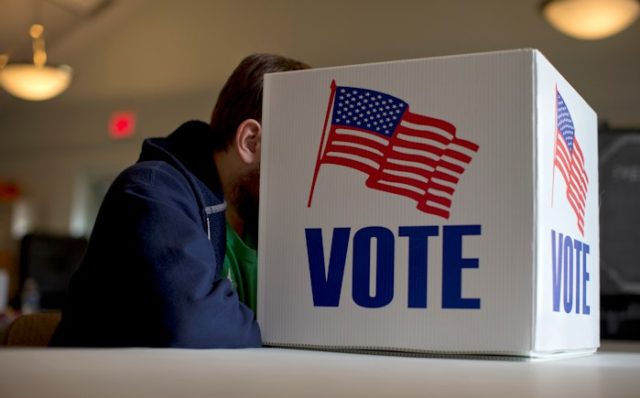Citing national security concerns, the Department of Homeland Security is making an aggressive play to take charge of elections.
(DC) “We should carefully consider whether our election system, our election process, is critical infrastructure like the financial sector, like the power grid,” said Homeland Security Sec. Jeh Johnson (pictured above, far left) at a conference in August.
“There’s a vital national interest in our election process, so I do think we need to consider whether it should be considered by my department and others critical infrastructure,” he explained, underscoring that the problem is the lack of federal control: “There’s no one federal election system. There are some 9,000 jurisdictions involved in the election process,” he said.
The security risks have come under increased scrutiny in recent days after the FBI revealed that two state election boards were victims of cyber attacks, a report that’s giving DHS more ammunition to take control of the election process.
On August 18, the FBI issued a bulletin to all private-industry partners involved in the election process about potential hacking attempts, encouraging them to tighten their security protocols. “The FBI is requesting that states contact their Board of Elections and determine if any similar activity … has been detected,” the FBI’s cyber division stated in a bulletin, explaining that an “unknown actor scanned a state’s Board of Election website for vulnerabilities” and successfully conducted “data exfiltration.” Hackers also used the same vulnerability in another state’s Board of Election system, the FBI explained.
The Washington Examiner notes that Homeland Security’s description of its “critical infrastructure” mandate on its website offers a rationale for the federal takeover of elections.
“There are 16 critical infrastructure sectors whose assets, systems, and networks, whether physical or virtual, are considered so vital to the United States that their incapacitation or destruction would have a debilitating effect on security, national economic security, national public health or safety, or any combination thereof,” explains DHS. According to White House policy, the federal government must “strengthen the security and resilience of its own critical infrastructure,” oversee “the continuity of national essential functions,” and “organize itself to partner effectively with and add value to the security and resilience efforts of critical infrastructure owners and operators.”
In other words, get ready for some federal “oversight” of national elections. What could go wrong?







